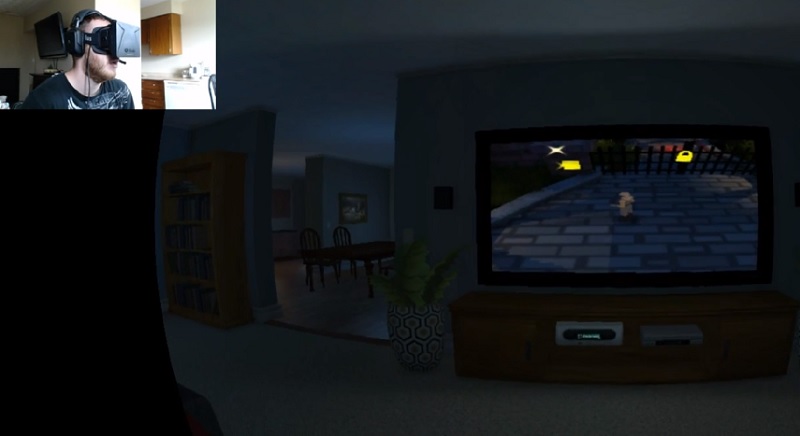
“Alone. Yes, that’s the key word, the most awful word in the English tongue. Murder doesn’t hold a candle to it and hell is only a poor synonym.†– Stephen King
The horror genre is one undergoing something of a renaissance of late. Indie titles like  Amnesia: the Dark Descent and the more recent Outlast have been trying to take the genre away from it’s image as the home of jump scares and volume spikes to something quieter, more insidious and altogether more dreadful (in a good way, of course). And since the essence of horror lies in its immersion factor, it should come as no surprise that the growing potential of Virtual Reality technology appeals to those developers looking to scare us all out of our skins. Alone is the brand new horror title by indie developers Greenwood Games, being developed exclusively for the Oculus Rift. Greenwood head honchos Bryan Cohen and Dan Wallace were gracious enough to answer some questions for us here at SpawnFirst, so without further ado, lets let them do the talking:
Can you tell us about yourself, and Greenwood Games?
Games have always been a part of my life since I was 5 years old, and ever since that point I knew developing was what I wanted to do. Fast forward two decades and a childhood of being a nerd I graduated from Full Sail University in 2007 and have been working in the Industry ever since. I’ve worked on previous titles such as Guitar Hero and Skylanders, but Alone will be my first title as an Independent Developer.
Greenwood Games formed after our initial prototype for Alone received an overwhelming positive response in the Oculus Rift VR Jam. We felt like we had something really special on our hands and we both had the time to invest in a start-up. We haven’t looked back since!
Shadows can play tricks on your eyes and the wind through the trees can cause a chill to run up your spine – but what if those fears of being alone suddenly come true?
Can you explain the premise of Alone?
Alone is a horror virtual reality game that focuses on that creepy  sensation we get when we are alone in a dark house at night playing video games. Shadows can play tricks on your eyes and the wind through the trees can cause a chill to run up your spine – but what if those fears of being alone suddenly come true? Alone investigates those fears by placing you on a couch in a familiar living room, tasked with the objective of playing a video game on your television. As you progress through the game-within-a-game more and more of it begins to spill out into your virtual living room.

What led to your decision to develop a horror game for the Oculus Rift?
We both really love the horror genre and we had this feeling that the Oculus Rift would heighten any scares and thrills. For a long time we had always talked about how awesome it would be to develop a game that was inspired by the ‘Creepypasta’ genre, which is a sub-set of the horror genre usually involving meta-aspects and breaking the fourth-wall. Alone was our opportunity.
Â
We also really wanted to try something new. Most horror game involve running and hiding from someone or something. The idea of sitting on a couch is perfect, because that’s usually where you are when you play video games, and totally adds that next level of immersion.
Are there any horror games or other media that influence Alone?
Paranormal Activity, Blair Witch and Jumanji were thrown around a lot. I also was inspired by Alfred Hitchcock for a lot of the core concepts –  a looming unknown fear, sewing your own demise, fridge horror – that sort of stuff. The other big one was Creepy Pasta writing, which we stated above.Â
Was the ‘game within a game’ idea of Alone inspired by any horror games you’ve played in the past?
Haha yeah. As primitive as the ‘game within a game’ is in the prototype, I basically based it off older-gen Silent Hill games. I think PewDiePie actually made a comment about how it looked like Silent Hill for handheld – he was pretty dead on.
We also really wanted to try something new. Most horror game involve running and hiding from someone or something. The idea of sitting on a couch is perfect, because that’s usually where you are when you play video games, and totally adds that next level of immersion.
Aside from the platform, what do you think makes Alone different from most of the other horror games on the market?
Alone isn’t about jump-scares or being overly terrified to the point where you don’t want to play. It’s not a game about exploring a scary place, or being hunted down by a spooky ghost. It’s not even a game about being tortured in the most graphic way possible. It’s a game about immersing you in a mundane, familiar situation and then slowly surrounding you by the horror until it’s too late to escape.
We feel like this sort of fear is a totally untapped territory, and where we wanted to go from the beginning.Â
When designing a game like Alone, what aspects of the game do you think are most important? E.g graphical style, sound design, gameplay elements
Every part is important. There is no “most important part” – without art the game wouldn’t shine, without sound the game wouldn’t sing and without engineering the game wouldn’t run. Hah, to be less philosophical we rely heavily on all disciplines to make Alone a great game. A superb art team allows us to deliver a top-notch product that skirts the edge of realism. Our amazing audio team will allow us to have extremely high-quality 3D audio to better immerse you in the game. Even superb gameplay allows the player to forget they are playing a game-within-a-game and become totally immersed.
How would you like players to feel after completing Alone?
Satisfied. (Editor’s note: straight and to the point. I like that)
What attracted you to the Oculus Rift as a development platform?
I’ve always LOVED VR since I was a kid. I remember thinking that we would have to have entire warehouse’s where the whole floor would be a treadmill to come this far. I’m glad I was wrong, haha. The Oculus Rift really is the next step in Virtual Reality. It’s an affordable option to consumers and they’ve made it so easy for developers to integrate it into their games. I think a lot of people, including myself, share the sentiment of “the best is yet to come”.

Do you think that VR interfaces like the Rift will become the norm in gaming?
After using a Rift you’re not going to want to go back to conventional gaming – at least in the long term. There’s still some issues to be worked out, and there’s always the hurdle of ‘VR sickness’, but I think once VR devices become more mainstream you will see a strong shift to both Virtual Reality and Augmented Reality. It really is the next step in video games.
The Oculus Rift really is the next step in Virtual Reality. It’s an affordable option to consumers and they’ve made it so easy for developers to integrate it into their games. I think a lot of people, including myself, share the sentiment of “the best is yet to come”.
Are there any challenges presented by developing for the Rift as opposed to traditional platforms?
As I mentioned before, VR Sickness is the one I think will be a challenge for a while. It’s hard to predict how and when any unique player will begin to feel sick if at all. In addition, not much is known about all the effects of VR sickness and what causes it. I for example start to feel sick when moving quickly vertically after a moderate amount of time – my friends however can tough it out.
Another hurdle is presenting the player to himself in a way that he recognizes. For example, in our prototype we really wanted the player to have a body holding a controller. We didn’t have the time and resources for it so it didn’t make it in. The effect is you end up feeling like floating head rather then a grounded character really in the environment. I think most developers are quickly finding this out and are beginning to incorporate impressively done POV characters.
What advantages do you feel you have as an indie developer, rather than as part of a large company?
We trust each other to do our jobs. There’s an immense amount of mutual respect and understand about needs and wants for the project. It’s also nice to manage a business in a way that is cohesive to actually having a personal life – a lot of game vets can attest to the long and somewhat brutal hours required to work at most AAA studios. I don’t believe it has to be that way, and I think more and more Indie Studios in particular will come around to this line of thinking. Being Independent allows us to set our own schedule and our own deadlines, we report to ourselves and everyone is invested in the product – It’s a great formula.
Alone is currently on Kickstarter with, at the time of writing, 26 days left to reach its goal of $25,000 dollars. if you’d like to contribute, then the donation page can be found
here. Devs like Greenwood are taking gaming in an exciting new direction, and hopefully it won’t be too long before we have a horror game where hiding behind the sofa only makes things worse.














